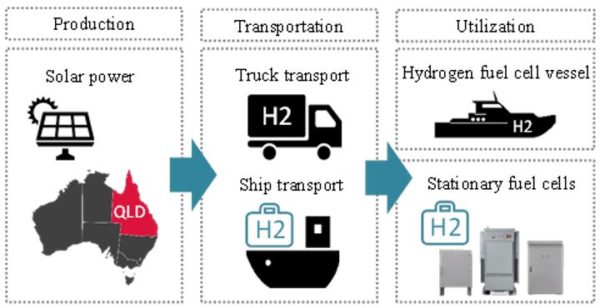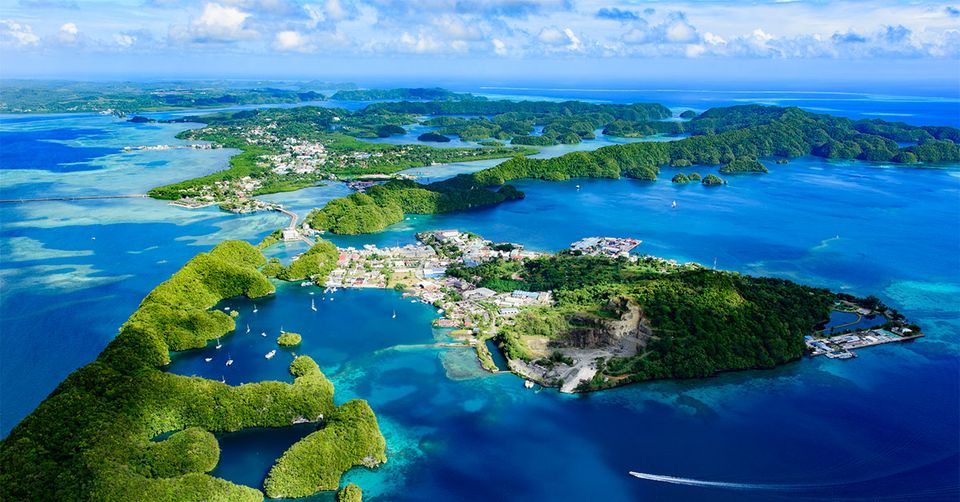Japan’s Sojitz Corporation announced solar power generated at the Kogan Hydrogen Demonstration Plant, being developed by CS Energy near Chinchilla in Queensland’s Darling Downs region, will be used to convert water into green hydrogen for export to the Republic of Palau where it will be used in transport applications and stationary fuel cells for power generation.
The three-year trial project, which is supported by Japan’s ministry of the environment, will assess the potential of green hydrogen for power generation and to fuel marine vessels to reduce the archipelago’s reliance on carbon-intensive diesel.
Palau comprises more than 200 islands in the western Pacific Ocean and the residents depend heavily on diesel for power generation and transport fuels, but the nation aims to shift 45% of its electricity generation to renewables by 2025.
At present, more than 1,000 gasoline-fuelled small vessels are used for tourism, fishing and other daily activities and the project will explore the potential of converting those craft to hydrogen-fuelled vessels.
Sojitz said demonstrations with hydrogen-fuelled vessels will first be conducted off the Queensland coast.
Sojitz said in a statement CS Energy will generate and supply the renewable hydrogen, while Nippon Engineering Consultants will study the feasibility of supplying green hydrogen from Australia for use by other Pacific Island countries.
It will also investigate hydrogen applications and forecast hydrogen demand based on the needs of Palau and those other Pacific Island countries and will look to identify the optimal maritime route and best options for transporting hydrogen.

Sojitz said at the conclusion of the project, it and its partners will “seek to achieve early commercialisation of an economically efficient hydrogen supply chain that will extend to include neighbouring Pacific Island countries”.
CS Energy said while the project will initially target Palau and other Pacific Island nations, it could also deliver benefits for island communities closer to home.
“We are delighted to welcome Sojitz Corporation as the first offtaker for our Kogan Renewable Hydrogen Project,” the company said.
“We are excited to collaborate with Sojitz as they seek to find creative solutions to the energy challenges faced by our Pacific near neighbours and which have potential for application to island communities in Queensland.”
CS Energy’s Kogan Hydrogen Demonstration Plant, given the go ahead after a successful feasibility study with Japanese industrial giant IHI Corporation Japan, will be capable of producing an estimated 50,000 kilograms of solar-powered green hydrogen each year.
CS Energy chief executive Andrew Bills said the facility will focus on the hydrogen electrolyser being powered exclusively by behind-the-meter solar energy, making it one of the few truly ‘green hydrogen’ projects in Australia.
To be built beside the existing coal-fired Kogan Creek Power Station, the facility will include a 600-700 kW hydrogen electrolyser, a 2 MW solar farm, a 2 MW/4 MWh battery energy storage system and a hydrogen fuel cell of up to 50 kW.
Construction on the facility is expected to commence this year with commissioning scheduled in early 2023. The export of green hydrogen to Palau is expected to begin in the same year.
This content is protected by copyright and may not be reused. If you want to cooperate with us and would like to reuse some of our content, please contact: editors@pv-magazine.com.









By submitting this form you agree to pv magazine using your data for the purposes of publishing your comment.
Your personal data will only be disclosed or otherwise transmitted to third parties for the purposes of spam filtering or if this is necessary for technical maintenance of the website. Any other transfer to third parties will not take place unless this is justified on the basis of applicable data protection regulations or if pv magazine is legally obliged to do so.
You may revoke this consent at any time with effect for the future, in which case your personal data will be deleted immediately. Otherwise, your data will be deleted if pv magazine has processed your request or the purpose of data storage is fulfilled.
Further information on data privacy can be found in our Data Protection Policy.